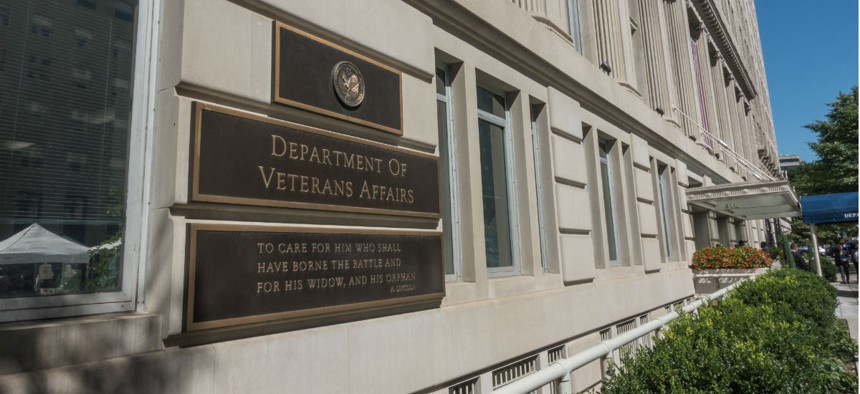
By bakdc / Shutterstock.com
VA Whistleblowers Tell Congress Retaliation Is Still Rampant
One VA employee received a proposed firing notice just one day prior to testifying.
The Veterans Affairs Department continues to punish employees who speak out against dangerous or improper practices at the agency despite targeted efforts in recent years to reverse its retaliatory culture, several high-profile whistleblowers told a House committee on Tuesday.
Reprisal through intimidation, harassment and discipline continue to plague the department, the whistleblowers and outside watchdog groups told the House Veterans' Affairs Committee panel on oversight and investigations. They cited the newly formed Office of Accountability and Whistleblower Protection—which President Trump created by executive order and later codified when he signed the 2017 VA Accountability and Whistleblower Protection Act into law—for exacerbating the systemic problems at the department, citing a host of problems with the office’s structure and processes.
One employee, Minu Aghevli, received a termination notice one day prior to the hearing. Aghevli called the decision “obviously retaliatory” given its timing and Rep. Chris Pappas, D-N.H., who chaired the hearing, said it was “a little suspicious.” Rep. Jack Bergman, R-Mich., the top Republican on the panel, told Pappas—a freshman—he would soon learn that VA is not capable of acting that quickly. Aghevli later clarified that she notified her supervisor weeks ago that she would testify before the committee.
Aghevli, a coordinator for opioid treatment for VA’s Maryland Health Care System, made her initial disclosure regarding leadership pressuring her to manipulate waitlist statistics. She said she has faced a series of proposed disciplinary actions since shedding the light on those issues, though they were ultimately withdrawn after she involved oversight bodies such as the Office of Special Counsel. Two months ago, however, VA stripped Aghevli of her patient health care privileges when she visited a veteran who had overdosed after he had been discharged from VA care.
“It is devastating to receive because I’ve never worked anywhere but VA,” Aghevli said. “It feels like my whole world.”
She and other whistleblowers emphasized that veterans are the true victims of VA’s alleged retaliation, as they fail to receive adequate services. Aghevli noted the difficulties of addiction recovery and said she is sometimes the most stable person in a veteran’s life. She suggested, while fighting back tears, that her proposed firing was meant to send a signal to employees to warn them against speaking out.
Jeff Dettbarn, an Iowa-based VA employee who said he was “mothballed” after disclosing his facility was canceling patients’ appointments without doctors’ orders, said he kept working in the department because of his passion for helping veterans.
“At this point in my life, I haven't much to lose or much to gain,” he said. “The veterans I stand up for do have a lot to lose: their lives.”
Dettbarn echoed all of the VA employees testifying in voicing frustration with the Office of Accountability and Whistleblower Protection, saying it had failed to assist his case. Some of the whistleblowers said the office took more than a year to respond to their requests for assistance and then turned over their documents to their supervisors.
Government Executive reported in April that the VA inspector general was investigating the office for alleged whistleblower reprisal. Several VA employees who have been interviewed by IG investigators expressed frustration or anger toward the office, describing feelings of betrayal or neglect. They said they have shared information with the investigators, including documentation of alleged reprisal.
VA employees said they now feel disincentivized to come forward and that the protective office has turned on whistleblowers by seeking to punish those they said they would help.
The IG is leading the investigation from its new Office of Special Reviews, which the IG created to conduct “prompt reviews of significant events” and examine allegations of senior VA employee misconduct, a spokesman for the investigators said.
The whistleblower protection office’s formation was mostly celebrated, with advocates hopeful that the focus on the rights and protections for whistleblowers would reverse a culture infamous for intimidation and reprisal. That optimism has largely soured, however, leading to hotline tips to the inspector general and bipartisan scrutiny from Congress.
Employees and advocates proposed several improvements for the office, including hastening its communication with whistleblowers and ensuring independence between its investigations and supervisors potentially at fault. Officials at the Government Accountability Project, Project on Government Oversight and Whistleblowers of America agreed the office should formalize its procedures and suggested that having multiple layers of various offices that investigate the same cases simultaneously is an inefficient use of resources. They also called on investigators to focus more on supervisors who orchestrate problematic behavior rather than front-line employees who carry out orders.
Prior to the hearing, VA Secretary Robert Wilkie issued a letter to the committee to voice his concern over the department’s lack of involvement in the hearing. Absent any testimony from a VA official, Wilkie said the committee would lack important context and facts.
“When the committee holds a hearing to air criticisms of the department, while simultaneously preventing the department from participating to offer context and defend itself, the committee’s efforts risk appearing more like a political press conference than a hearing aimed at a balanced look at serious issues,” Wilkie wrote. “If this is how the committee intends to conduct oversight of the department in the future, an exclusionary approach could chip away at the committee’s oft stated goal of bipartisanship.”
Pappas said the intention was always to conduct a second hearing that would include VA and other government officials. He promised to work with minority members to schedule that hearing as quickly as possible.







